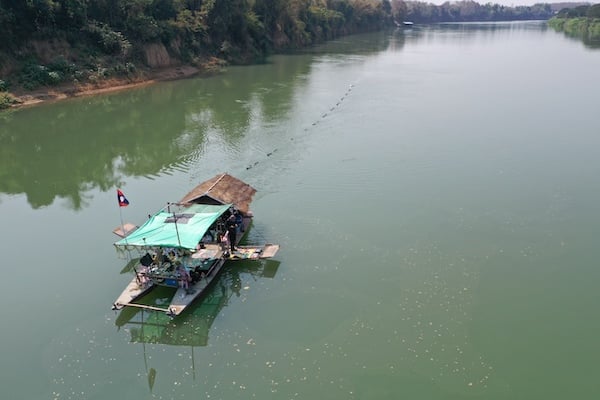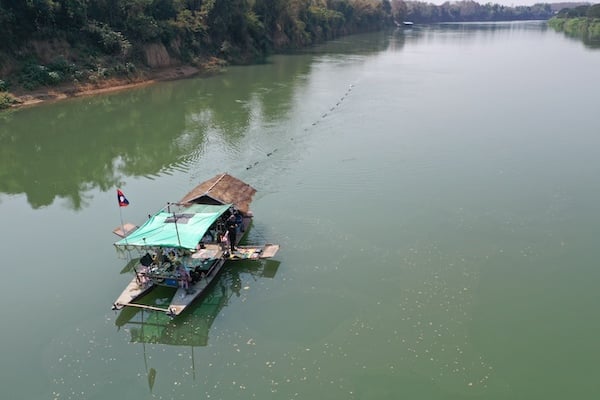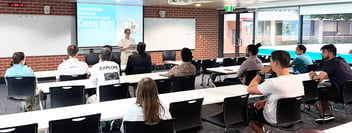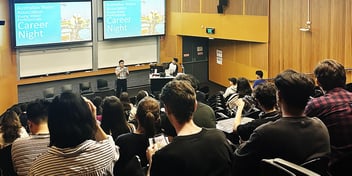Young Tall Poppy Award celebrates Flinders University fellow's hydrogeology achievements

Flinders University’s Dr Eddie Banks, Senior Research Fellow at the National Centre for Groundwater Research and Training, has been recognised in this year’s Young Tall Poppy Awards for his research in hydrogeology and community outreach promoting interest in water science.
Hosted by the Australian Institute of Policy and Science, the prestigious annual awards celebrate the achievements of Australia’s outstanding young scientific researchers and communicators.
With his own interest in science starting in high school, working part-time as a landscaper, Dr Banks said he always had a feeling he’d end up working in a water related field.
“I was a very outdoorsy kid. I grew up on a rural property and was always playing down in the creek. My interest in water started at a local level, but working in environmental science is also a really great way to see the world,” he said.
Banks went on to study environmental science and completed a PhD in hydrogeology, a path that has nurtured his interest in and current research in sustainable water resources.
“Groundwater is usually considered an alternative water supply, but surface water and groundwater are intimately connected. Historically, surface water has been seen as the priority water resource, but it’s been over-allocated in many countries, with many communities turning to groundwater,” he said.
“Unfortunately, this sometimes involves double accounting. And that's what we've seen play out in Australia in the last 20 years. We’ve been allocating surface water, but in reality, we’ve been allocating both the surface water and groundwater. And the rivers are going dry.”
Banks said his special interest in the field of sustainably managing water resources involves applying novel field techniques to gain a better understanding of these processes, not just in Australia, but in surface water and groundwater systems around the world.
“We've had a recent project in Laos, where we travelled by boat down one of the major tributaries of the Mekong River, carrying a plethora of specialised instruments, sampling the water quality as we went,” he said.
“We were looking at the exchange between surface water and groundwater. The aim was to identify areas where the river was losing or gaining water based on particular constituents within the water itself. This involved using a combination of near surface geophysical techniques, river flow gauging, and time series of dissolved gases and environmental tracers.”
Community outreach
The project in Laos was part of an outreach program with Geoscientists Without Borders. Banks said working with communities to foster a better understanding of water resources is one of the most fulfilling parts of his research.
“This has been really rewarding work. The academic side of research focuses heavily on journal publications, but you're usually only reaching a very specific audience. Being involved in outreach programs offers the opportunity to reach a much broader audience and often has greater impact,” he said.
“The training and upskilling of people that don't often have access to some of the tools that we use in the field of hydrogeology is great. It's not just about publishing new research, but about getting the science and the cutting-edge techniques out there to help build capacity within communities.”
Banks has also been involved in other outreach work, including presenting to natural resource management organisations and community groups in Australia.
“I live in the Willunga Basin, which is part of the beautiful McLaren Vale wine region. All the water resources, both surface water and groundwater, are allocated. As part of the National Centre for Groundwater Research and Training, I collaborated on a project looking at better understanding the key hydrological processes within the basin,” he said.
“This included characterising the water residence time within the major aquifer systems, evaluating the surface water and groundwater interactions of the ephemeral rivers, and examining the risks of seawater intrusion along the coast.
“There’s a number of community groups who are interested in what we've been doing in the region in terms of management of the water resources and what the major threats to the environment are with respect to declining rainfall and water availability and potential impacts to the industries that rely on a secure water supply.”
Hydrogeology in action
Banks's research has taken him all over the world, but he was recently involved in a project on a remote island community in Arnhem Land, Northern Territory, investigating the long-term sustainability of groundwater from a freshwater lens.
“The island is solely reliant on groundwater. There is no surface water. And that water supply is there to essentially support a community of about 2000 residents. Our work was addressing management questions, including estimating the recharge rate to the freshwater lens and sustainable rates of extraction,” he said.
“We wanted to know how much groundwater could be extracted sustainably without seawater intruding into the aquifer where the production bore field was located. We wanted to know if the utility provider needed to consider alternative water supply options in the case of successive low rainfall during wet seasons.”
Another of Banks’s research projects is in New Zealand, where he assesses braided river systems and determines the leakage rate from the rivers into underlying aquifers, and explores how leakage changes, spatially and temporally.
“New Zealand has a lot of surface water, but much of that water comes off the alps and runs across the glacial valleys and plains. Those streams are very important hydrologically, as they replenish the aquifers beneath the plains and support irrigators, who use the resulting groundwater to irrigate pastures,” he said.
Hydrogeology has also taken him to Africa, where he was involved in addressing hand pump bore sustainability and groundwater contamination issues.
“Groundwater is strongly relied upon, in some parts of the world, for access to clean, and safe, and reliable water supplies. But not all aquifers are suitable for drinking,” he said.
“It might be something as simple as high salinity. Or, there might be a hand-dug well, but not far away there's also a septic tank that's been constructed. Or, if there is livestock within the groundwater recharge area, that can contaminate water supply, too.
“This project was about looking at the water residence time within those shallow aquifers to determine possible contamination pathways and the key risks or issues for the community’s health.”
Following the recognition of his work in the 2021 Young Tall Poppy Awards, Banks has been visiting high schools to talk about his work and continue to encourage students’ interest in science.
“I’ve been explaining to the students that there are so many experiences to be had in a career in science. It’s pretty amazing. I get to travel and work on really interesting projects. Often at times, it doesn’t even feel like work,” he said.



